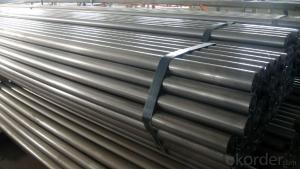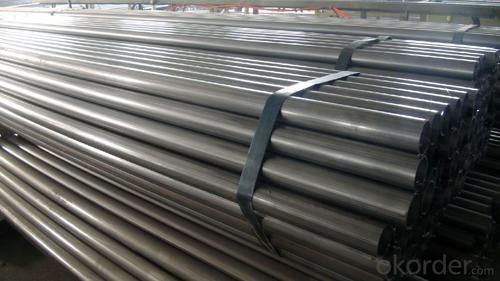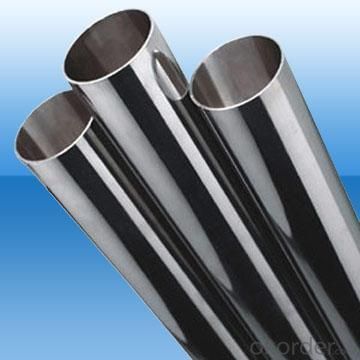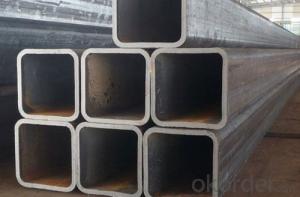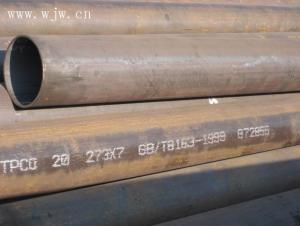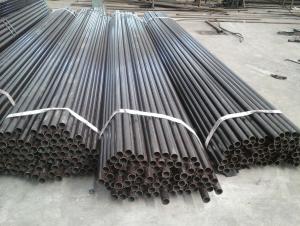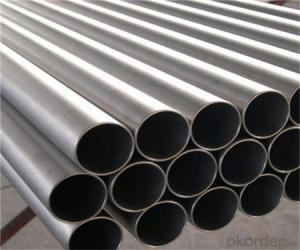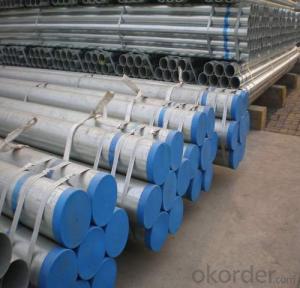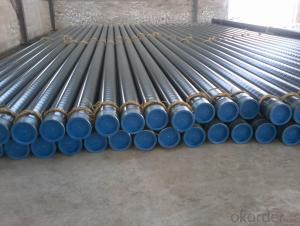Thin Wall Carbon Steel Seamless Pipe Manufacturers
- Loading Port:
- Tianjin
- Payment Terms:
- TT OR LC
- Min Order Qty:
- 35 m.t
- Supply Capability:
- 5000 m.t/month
OKorder Service Pledge
OKorder Financial Service
You Might Also Like
Specification
Structure :
Seamless pipe is formed by drawing a solid billet over a piercing rod to create the hollow shell. As the manufacturing process does not include any welding, seamless pipes are perceived to be stronger and more reliable. Historically seamless pipe was regarded as withstanding pressure better than other types, and was often more easily available than welded pipe.
Main Features :
• High manufacturing accuracy
• High strength
• Small inertia resistance
• Strong heat dissipation ability
• Good visual effect
• Reasonable price
Specification:
1) Material:20#(ASTM A 106/A53 GRB.API5LGRB,GB),45#,16Mn,10#.
2) Specification range:OD:21.3-610mm,WT:6-70mm,length:6-12m or according to the requirement of clients.
3) Excutive standards:GB,ASME API5L.ASTM A 106/A53,Despite of the above standards,we can also supply seamless steel pipe with standard of DIN,JIS,and so on,and also develop new products according to the requirements of our clients!
4) Surface:black lacquered,varnish coating or galvanized.
5) Ends:Beveled or square cut,plastic capped,painted.
6) Packing:bundles wrapped with strong steel strip,seaworthy packing.
FAQ :
A. How is the quality of your products?
Our products are manufactured strictly according to national and internaional standard, and we take a test on every pipe before delivered out. If you want see our quality certifications and all kinds of testing report, please just ask us for it.
Guaranteed: If products’ quality don’t accord to discription as we give or the promise before you place order, we promise 100% refund.
B. How about price?
Yes, we are factory and be able to give you lowest price below market one, and we have a policy that “ for saving time and absolutely honest business attitude, we quote as lowest as possible for any customer, and discount can be given according to quantity”,if you like bargain and factory price is not low enough as you think, just don’t waste your time.Please trust the quotation we would give you, it is professional one.
C.Why should you chose us?
Chose happens because of quality, then price, We can give you both.Additionally, we can also offer professional products inquiry, products knowledge train(for agents), smooth goods delivery, exellent customer solution proposals.Our service formula: good quality+good price+good service=customer’s trust
SGS test is available, customer inspection before shipping is welcome, third party inspection is no problem.
Any question, pls feel free to contact us !
Product image:
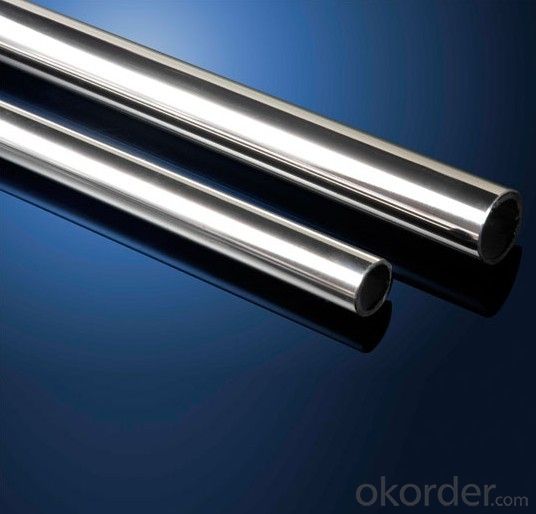
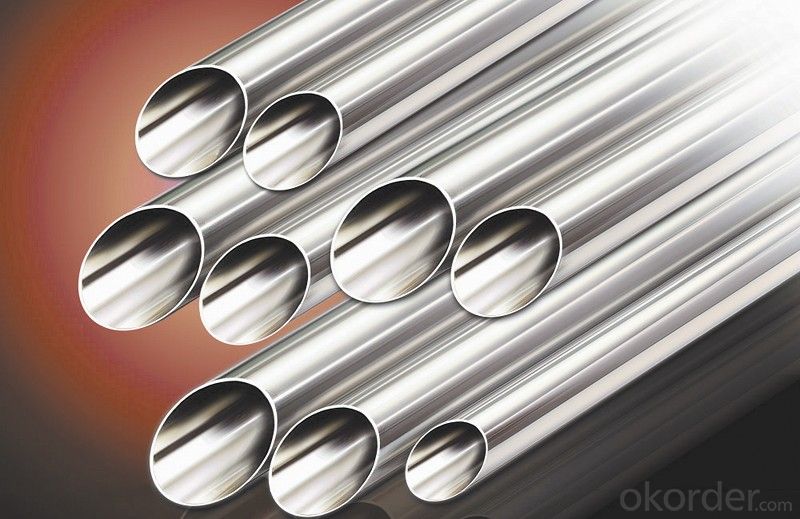
Company Information:
Since 2004, the trading volume of CNBM International has been doubled in 5 successive years owing to the support of superior corporations and effort of all staff. Meanwhile, we have established strategic partnerships with hundreds of domestic manufacturers and sound business relations with clients from over 120 countries. Currently, we have wholly-owned overseas subsidiaries and branches in 5 countries with a view to realize localization, which also represents an essential progress in our globalization target.
In line with the business, CNBM International launched E-business platform Okorder.com.Our goal is to transform CNBM International into the global leading brand in building materials industry within 3 to 5 years through innovation and reform, by strengthening the overall management of supply chain, developing and cultivating both domestic and overseas market, improving the procedure and information system, enhancing the ability to organize resources and to provide value-added services under a professional team and a learning organization.
- Q: How much is 4 inches steel tube MM?
- The nominal diameter of the 4 inch steel pipe is DN100, that is to say, the diameter of the center of the pipe wall is 100mm.
- Q: What are the different types of steel pipe connections?
- The different types of steel pipe connections include threaded connections, welded connections, flanged connections, and grooved connections.
- Q: Can steel pipes be used for underground electrical conduits?
- Yes, steel pipes can be used for underground electrical conduits. Steel pipes are durable, strong, and resistant to external forces, making them suitable for protecting electrical wiring in underground installations. Additionally, steel pipes offer excellent corrosion resistance, ensuring the longevity and safety of the electrical system.
- Q: What are the different methods of pipe bending for steel pipes?
- Some of the common methods of pipe bending for steel pipes include rotary draw bending, induction bending, and hot bending.
- Q: What are the common problems or issues faced with steel pipes?
- Common problems or issues faced with steel pipes include corrosion, rusting, leaks, cracks, and blockages. Corrosion can occur due to exposure to moisture or chemicals, leading to a decrease in pipe integrity and potential leaks. Rusting is another common problem, especially in outdoor or wet environments, which can weaken the pipe and cause structural issues. Leaks can result from pipe corrosion or cracks, leading to water damage and potential pipe failure. Blockages can occur due to debris, scale buildup, or pipe collapse, restricting the flow of fluid or causing complete pipe blockage. Regular maintenance and inspections are necessary to identify and address these issues promptly.
- Q: What is the difference between steel pipes and FRP pipes?
- Steel pipes and FRP pipes are commonly used in various industries and applications, but they differ in several ways: 1. Material Composition: Steel pipes are constructed from iron and carbon alloys, along with elements like manganese, silicon, and small amounts of other metals. Conversely, FRP pipes consist of a polymer matrix reinforced with fibers such as glass or carbon. 2. Strength and Durability: Steel pipes are renowned for their exceptional strength and durability, enabling them to endure high pressures, heavy loads, and extreme temperatures. Although FRP pipes are also strong and durable, they are comparatively lighter in weight and may not possess the same level of strength as steel pipes. Nonetheless, they excel in corrosion resistance and have a longer lifespan in corrosive environments. 3. Corrosion Resistance: Steel pipes are susceptible to corrosion and thus require protective coatings or linings to prevent rust and deterioration. In contrast, FRP pipes possess inherent corrosion resistance and do not necessitate additional coatings. Consequently, they are well-suited for transporting corrosive fluids or functioning in corrosive environments. 4. Installation and Maintenance: Installing steel pipes necessitates specialized welding or threading techniques. Consequently, installation can be more labor-intensive and time-consuming, particularly for complex or large-scale projects. Conversely, FRP pipes are lightweight and easily transportable and installed. Often arriving in pre-fabricated sections, they expedite installation, reduce labor requirements, and demand minimal maintenance in comparison to steel pipes. 5. Cost: Generally, steel pipes are more expensive than FRP pipes due to the higher cost of raw materials and the need for additional corrosion protection measures. FRP pipes offer a cost-effective alternative, particularly in applications where corrosion resistance is paramount, as they eliminate the necessity for expensive coatings or linings. Ultimately, the selection between steel pipes and FRP pipes depends on the specific requirements of the application. Steel pipes are favored for their high strength, whereas FRP pipes offer advantages such as corrosion resistance, lightweight construction, and cost-effectiveness.
- Q: How are steel pipes classified based on pressure ratings?
- Steel pipes are classified based on pressure ratings by assigning them different schedules, ranging from Schedule 10 to Schedule 160. Each schedule represents a different maximum pressure that the pipe can withstand, with higher schedules indicating higher pressure ratings.
- Q: Are steel pipes suitable for use in food processing industries?
- Yes, steel pipes are suitable for use in food processing industries. Steel pipes are highly durable, resistant to corrosion, and can withstand high temperatures and pressures, making them ideal for transporting various food products and fluids. Additionally, steel pipes are easy to clean, maintain hygiene standards, and comply with food safety regulations, making them a reliable choice for the food processing industry.
- Q: How are steel pipes used in the construction of oil and gas pipelines?
- Steel pipes are commonly used in the construction of oil and gas pipelines due to their strength, durability, and resistance to corrosion. These pipes are primarily used for transporting oil and gas over long distances, ensuring a reliable and efficient flow of these resources. The steel pipes are welded together to form a continuous pipeline that can withstand high pressure and extreme weather conditions. Additionally, their smooth interior surface minimizes friction and allows for efficient transportation of oil and gas.
- Q: How are steel pipes used in construction?
- Steel pipes are commonly used in construction for various purposes such as structural supports, plumbing systems, and underground utility installations. They provide strength, durability, and flexibility, making them suitable for carrying fluids, gases, and structural loads. Steel pipes are often used in the construction of buildings, bridges, and infrastructure projects, ensuring reliable and long-lasting performance.
Send your message to us
Thin Wall Carbon Steel Seamless Pipe Manufacturers
- Loading Port:
- Tianjin
- Payment Terms:
- TT OR LC
- Min Order Qty:
- 35 m.t
- Supply Capability:
- 5000 m.t/month
OKorder Service Pledge
OKorder Financial Service
Similar products
Hot products
Hot Searches
Related keywords
